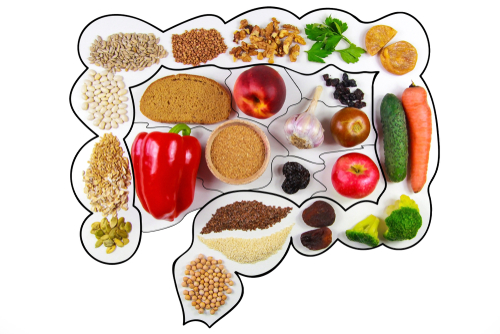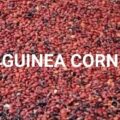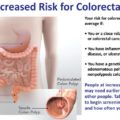What does the colon do?
The colon is about 5 feet long, and is part of the digestive tract in the body. It’s often called the large intestine or the large bowel. When food enters the body, it’s digested mostly in the small intestine, where vitamins and minerals are taken out. After that, the food moves into the colon. The colon takes out water, and bacteria in the colon help break down the food to prepare it to leave the body. A healthy colon basically functions as the “cleanup” crew of the body.
Just as diet can have a positive or negative impact on heart, brain and bone health, your colon’s overall health can be affected by what you eat.The colon is a crucial part of the digestive system, and many different conditions can cause it to work improperly. Some of these include inflammatory bowel diseases, such as ulcerative colitis and Crohn’s disease; diverticular disease; irritable bowel syndrome; and colorectal cancer.
Colorectal cancer is one of the most serious colon diseases. It’s the third most common cancer and the third deadliest cancer in the U.S. Risk factors for colon cancer include age (risk increases over age 50); race (blacks have the highest rates of colorectal cancer in the U.S.); family history; previous polyps; inflammatory bowel disease; smoking; and heavy alcohol use.
“There is also a strong correlation between obesity and having a higher risk of getting cancer in the colon,” says Joshua Melson, MD, MPH, a gastroenterologist who specializes in colorectal cancer at Rush University Medical Center.
A weighty connection
According to the National Cancer Institute, the association between obesity and increased colon cancer risk may be due to multiple factors, including increased levels of insulin in the blood, a condition that may occur more often in obese individuals. Increases in insulin and associated conditions such as insulin resistance may promote the development of certain tumors, including those in the colon.
The American Cancer Society reports that the links between diet, weight, exercise and colorectal cancer risk are some of the strongest for any type of cancer. In fact, an estimated 50 to 75 percent of colorectal cancer can be prevented through lifestyle changes like healthy eating, according to the Colon Cancer Foundation.
“Fewer than 10 percent of colon cancers are hereditary, which means a lot of it is lifestyle,” says Heather Rasmussen, PhD, a registered dietitian at Rush. “Therefore, good nutrition is an important aspect of good colon health.”
Diet dos and don’ts
Diets high in vegetables, fruits and whole grains and low in red and processed meats have been associated with a decreased risk of colon cancer, according to the ACS. To help promote good colon health, follow these five diet recommendations:
- Limit red meat consumption and steer clear of processed meats.
According to the ACS, the risk of colon cancer increases by 15 to 20 percent if you consume 100 grams of red meat (the equivalent of a small hamburger) or 50 grams (equivalent of one hot dog) of processed meats, like sausage, bacon or hotdogs, per day.
“You can still have a little bit of red meat — about two four-ounce servings of red meat per week,” says Rasmussen. “However, it is best to limit processed meats to a special treat now and then because they have other components, such as preservatives, that may cause cancer.”
Fewer than 10 percent of colon cancers are hereditary, which means a lot of it is lifestyle. Therefore, good nutrition is an important aspect of good colon health.
- Hold the sugar.
Studies have found that people with ulcerative colitis and Crohn’s disease often have diets high in sugar and low in fiber. While sugar has not been directly associated with the progression of colon cancer, foods high in sugar are often high in calories and can lead to weight gain and obesity.
- Up your fiber intake.
Eating a high-fiber diet is good for overall intestinal and colon health.
“On average, Americans eat about 13 grams of fiber a day, but we’re supposed to have 25 to 35 grams,” says Rasmussen.
The best way to add fiber into your diet is through fiber-rich fruits and vegetables, such as raspberries, pears, apples, bananas, oranges, cooked artichoke, peas, broccoli and corn. Whole grains and legumes are also good sources of fiber.
Fiber aids colon health by helping to keep you regular and prevent constipation. This may then lower your risk of developing hemorrhoids and small pouches in your colon that can lead to diverticular disease.
- Drink your milk.
Recent studies have found that calcium and vitamin D may be associated with a decreased risk of colorectal cancer. However, the ACS does not recommend that men increase their calcium intake above the recommended amounts because there is a potential increased risk of prostate cancer associated with high calcium intake (exceeding 2,000 milligrams a day).
Instead, both men and women should make sure to get their recommended daily dose of calcium: depending on age, that is 1,000 milligrams to 1,300 milligrams a day (three to four eight-ounce glasses of low-fat or fat-free milk).
Other dietary sources of calcium include dark leafy greens, such as spinach, kale and collard greens.
- Choose grains wisely.
Whole grains are foods that contain all their essential parts and naturally occurring nutrients. The Dietary Guidelines for Americans recommend that all adults eat at least half of their daily grains as whole grains, about three to five servings.
Some readily available whole grains include barley, quinoa, whole wheat flour, wild and brown rice and oatmeal. These foods contain more colon-friendly vitamins, minerals, fiber, essential fatty acids, antioxidants and phytochemicals (natural compounds in plants that have a beneficial effect on the body) than their refined grain counterparts, such as white flour and white rice.
Make screening a priority
While eating right can help keep your colon happy, the most powerful way to prevent colon cancer is through screening. A colonoscopy is a structural examination of the colon that allows physicians to both screen for and prevent colorectal cancer.
“Colonoscopy reduces the risk of developing colon cancer because we can find precancerous polyps during the test and remove them,” says Melson. “This test is unique to most screening tests because we can actually look for precancerous growths and remove them during the procedure, which ultimately reduces a person’s risk of developing colon cancer.”
If detected early, up to 95% of colorectal cancers are curable, according to the Colon Cancer Foundation. “Colon cancer is a largely treatable condition,” says Melson. “For colorectal cancer, we have a test, it is not complicated and it is extremely effective in preventing it and catching it early.” SEE: How Long Does Colon Cancer Take To Develop Develop ?
What Is a Colon Cleanse?
A colon cleanse is the act of flushing out your large intestine. The practice of natural colon cleansing, or colonic irrigation, dates back to ancient Greece. It became popular in the U.S. in the early 1900s. But theories behind it lost support, and it fell out of favor. Recently, though, colon cleansing — using teas, enzymes, or colon irrigation — has become more popular.
Is colon cleansing good for you?
Scientific research on colon cleansing is extremely limited. There’s no good evidence for most of the claims that its practitioners make. And the side effects can range from mild to serious.
Possible benefits of a colon cleanse include
- Improved mental outlook
- Improved immune system
- Weight loss
- Reduced colon cancer risk
It may also be performed at home by taking certain oral substances.
10 natural home remedies for colon cleansing
- Water flush: Drinking plenty of water and staying hydrated is the simplest way to regulate digestion. Drinking six to eight glasses of lukewarm water per day is recommended for colon cleansing. Additionally, eating fresh fruits and vegetables high in water content like watermelon and tomatoes would be helpful.
- Saltwater flush: Mixing two teaspoons of sea salt or pink salt with lukewarm water and drinking it on an empty stomach is helpful. It stimulates colon movements within a few minutes. This may be done twice a day.
- High-fiber diet: Fiber is an essential nutrient present in whole, healthy plant foods like fruits, vegetables, grains, nuts, seeds and more. Fibers help bulk up excess matter in the colon. They can regulate constipation and overactive bowels. They also boost helpful bacteria.
- Lemon water and honey: Mix fresh lemon juice, one teaspoon of honey and a pinch of salt with warm water and drink on an empty stomach in the morning.
- Juices and smoothies: These include fruit and vegetable juice fasts and cleanses. Juices made of apples, lemons and aloe vera help in colon cleansing. They also contain nutrients which are beneficial to the body.
- Probiotics: Probiotics help to cleanse the colon and boost good bacteria in the gut. Foods like yogurt, pickles, apple cider vinegar and other fermented foods are considered to be good probiotics.
- Herbal teas: Trying some herbal teas may assist digestive health via the colon. Laxative herbs like psyllium, aloe vera and marshmallow root may help with constipation.
- Ginger: Ginger stimulates digestion. It can be added to other juices, tea or eaten directly. One teaspoon of ginger juice and honey can be mixed with one cup of warm water. This can be consumed once or twice a day.
- Fish oil: Fish oils may be taken as supplements as well. They contain omega-3 fatty acids which are effective for colon cleansing.
- Fasting: Not eating anything is a method of colon cleansing. It helps the kidneys and liver eliminate harmful toxins from the body. Drinking water, fresh vegetable juices or fresh fruit juices while fasting can help.






